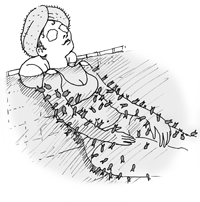STRANGE BUT TRUE- Eat me! Fish nibble skin troubles away

DRAWING BY DEBORAH DERR McCLINTOCK
Q. "Ichthyotherapy" is the word for it, but to certain psoriasis sufferers lucky enough to gain relief, it's "a slimy bottom-dwelling miracle." What/where are these miracle workers?– S. Burton
A. They're the fish "Garra rufa," of the minnow and carp family, hangers-out at the Turkish resort of Kangal to which thousands of people flock only to be "eaten alive," says New Scientist magazine. Here bathers spend hours in the 35C (95F) spa waters as the 10-centimeter fish gently nibble away at the dead skin. These "exfoliation" treatments have proven beneficial to some people with psoriasis. Studies show that G. rufa in conjunction with ultraviolet therapy can clear up psoriasis effectively, keeping symptoms at bay for months, perhaps because the sun penetrates better once the scaly skin patches are eaten off.
This is just one example of a growing number of "biotherapies," using living organisms to treat human diseases, such as sterile maggots for cleaning wounds or leeches to encourage blood vessel regrowth after surgery.
Q. If there's one relatively harmless experiment you're probably glad you missed, this is it. The subjects' nostrils flared, faces turned away and went pale, heart rates went down, blood pressure went up, sweat poured onto the skin, and finally stomachs started to convulse. Though they were paid good money to endure as long as they could, no one lasted more than five minutes. Lasted at what? –C. deBergerac
A. In a famous experiment, volunteers were given a full face blast of animal excrement–skatole– as a way of testing the human "pure disgust reaction in action," says Virginia Smith in Clean: A History of Personal Hygiene and Purity. Sensuous disgust is seated deep in the insula, the area of the brain that malfunctions in patients with obsessive-compulsive disorder, causing them to wash and clean things endlessly or vacuum unrelentingly. The opposite is sensuous delight, or all things "that pleaseth and comforteth the brain wonderfully," such as fine food, good music, soft caresses. Ironically, these have been much less studied than the objects of disgust, says Smith, while being apparently every bit as necessary for the body.
Q. "Cogito, ergo sum," or "I think, therefore I am," is the famous argument of 17th-century philosopher Rene Descartes. Famous but likely fallacious. How so? –J. Janowski
A. When Descartes says "I think," he is unconsciously presupposing the very "I" that he claims to be proving, points out Bertrand Russell in A History of Western Philosophy. Introspection in fact justifies his saying only "There are thoughts," which he can know beyond a doubt. But to jump from these thoughts to there having to be a "thinker" for them is a leap. The seductive imperatives of grammar– a predicate needing a subject, an action needing an actor– seem to have undermined his logic. Score it Grammar 1, Descartes 0.
Q. It's enough time for a skydiver to plunge 200 feet, for a raindrop to fall 30 feet, your car to go 100 feet, you to walk 6 feet, a runner to traverse 30+ feet, a meteorite to streak several miles across the heavens, sunlight to race 186,000 miles, a hair on your head to grow .0000004 inch and a fingernail .0000001 inch, a glacier to scrape over .0004 inch of bedrock. The glacial pace, by the way, is about 4,000 times faster than your lengthening fingernail but barely 1/200th of the pell-mell pace of the proverbial snail. Got a second to identify this universal unit of time? –R. Berne
A. It's the second, of course, along with some of the movements that can take place therein.
Q. Given that there are 600+ species of bacteria in the human mouth, it's no surprise halitosis is a common concern. Yet a quarter of "sufferers" are just imagining it. How do you know if you have the real thing? –S. Foley
A. Experts have subjects lick their wrist and rate the smell, then compare this to the ratings of odor judges, says New Scientist magazine. In general, people score themselves twice as smelly as do the judges, suggesting widespread "halitophobia." Patients will even get annoyed when they think they have a problem but are told they don't. To counter bad breath, Brazilians chew cinnamon bark, Iraqis chew cloves, in Singapore they chew the peel of giant guavas, in East Asia anise seeds. Yet even if it were possible to destroy all your oral bacteria, you wouldn't want to, says researcher Mel Rosenberg, since they keep other invaders such as yeast at bay. "A fungal infection in your mouth is much harder to deal with," he notes.
Q. Fishing with friends, you haul in so much catch that the craft floats lower and lower and starts taking on water. What to do? Throw a few piscine passengers overboard, and call it a day? –I. Walton
A. Why not just hang a few of the fish on hooks alongside the boat, so now the water they displace helps buoy the craft. But beware that other fish don't come along and steal your meals, à la The Old Man and the Sea.
Send Strange questions to brothers Bill and Rich at [email protected].
#